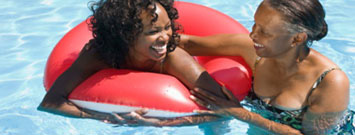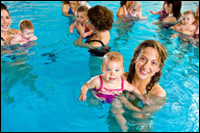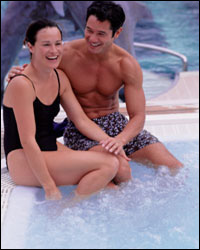Healthy Swimming Year-Round
 Stay healthy and avoid recreational water illnesses (RWIs) when you swim or use the hot tub by following some simple steps.
Stay healthy and avoid recreational water illnesses (RWIs) when you swim or use the hot tub by following some simple steps.
Even though it is frequently associated with summer, swimming is a physical activity many people enjoy all year long. Indoor pools, hot tubs, and even outdoor pools in warm climates are popular year-round.
Swimming is a fun activity for people of all ages and offers numerous health benefits; however, recreational water (water from pools and hot tubs) can also spread germs that cause illnesses known as recreational water illnesses (RWIs). The germs that cause RWIs are spread by swallowing, breathing in the mists or aerosols of, or having contact with contaminated water in swimming pools, hot tubs, water parks, water play areas, interactive fountains, lakes, rivers, or oceans. RWIs can also be caused by chemicals in the water or chemicals that evaporate from the water and cause indoor air quality problems. The good news is that there are a few simple steps you can take to help protect yourself and your family from RWIs whenever you swim.
Stay Healthy in the Pool
The best way to prevent RWIs is to take an active role in stopping the spread of germs by following the Triple A's of Healthy Swimming: Awareness, Action, and Advocacy.
1. Awareness
- Visit CDC’s Healthy Swimming website at www.cdc.gov/healthywater/swimming.
- Learn how to protect yourself and others from RWIs and follow the Six Steps for Healthy Swimming:
Three Steps for All Swimmers
Keep germs from causing recreational water illnesses (RWIs):
- Don't swim when you have diarrhea. You can spread germs in the water and make other people sick.
- Don't swallow the pool water. Avoid getting water in your mouth.
- Practice good hygiene. Shower with soap before swimming and wash your hands after using the toilet or changing diapers. Germs on your body end up in the water.
Three Steps for Parents of Young Kids
 Keep germs out of the pool:
Keep germs out of the pool:
- Take your kids on bathroom breaks or check diapers often. Waiting to hear "I have to go" may mean that it's too late.
- Change diapers in a bathroom or a diaper-changing area and not at poolside. Germs can spread in and around the pool.
- Wash your child thoroughly (especially the rear end) with soap and water before swimming. Invisible amounts of fecal matter can end up in the pool.
**Remember that swim diapers and swim pants, even if required at a pool, are not a replacement for frequent diaper changing and regular trips to the bathroom while swimming. Swim diapers and swim pants are not designed to keep diarrhea (the most serious water contaminant) from leaking into the pool. Parents should never allow their children to enter the water when they are ill with diarrhea, even if they are wearing swim diapers or swim pants.
2. Action
- Check pool water yourself using test strips purchased at your local hardware or pool supply store. CDC recommends the following water-quality ranges:
- Free chlorine level 1–3 parts per million (ppm)
- pH 7.2–7.8
- Ask the pool operator the following questions:
- Are the free chlorine and pH levels checked at least 2 times per day and more often when the pool is heavily used?
- What is the latest pool inspection score?
- Has he/she completed specialized training in pool operation?
3. Advocacy
- Encourage pool operators to take steps known to kill germs.
- Add ultraviolet or ozone technology to pool water treatment.
- Hyperchlorinate regularly; even the toughest germs, like Cryptosporidium (“Crypto” for short), can’t tolerate free chlorine levels at 20 ppm for 12.75 hours.
- Educate other swimmers about RWIs to promote healthy swimming.
Stay Healthy in the Hot Tub
 The germs that cause RWIs can also be spread in hot tubs. To stay healthy while soaking in the hot tub, follow these HOT steps! [PDF - 376KB]
The germs that cause RWIs can also be spread in hot tubs. To stay healthy while soaking in the hot tub, follow these HOT steps! [PDF - 376KB]
Heed… rules for safe and healthy use.
- Exclude children less than 5 years of age from using hot tubs.
- If pregnant, consult a healthcare provider before using hot tubs, particularly in the first trimester.
Observe... the hot tub and its surroundings.
- Hot tub temperature should not exceed 104°F (40°C).
- Check hot tub water; CDC recommends maintaining free chlorine at 2–4 parts per million [ppm] or bromine at 4–6 ppm, and pH at 7.2–7.8. Pool and hot tub test strips are available at local home improvement stores, discount retailers, and pool supply stores. If you want to practice using them at home, visit Pool and Hot Tub Test Strips Home Test Instructions.
Talk…to hot tub owners/staff and other hot tub users.
- Are chlorine or bromine and pH levels checked at least 2 times per day?
- Are these levels checked during times when the hot tub is most heavily used?
- Talk to hot tub staff and users about RWIs and share these tips with them.
Helpful Resources
To help spread the message about RWI prevention, CDC's Healthy Swimming Program has developed the following educational materials:
- Healthy swimming brochures available for free in English and Spanish.
- Fact sheets on frequently-asked RWI questions available in English and Spanish.
- Videos that remind swimmers to play it safe and stay out of the water when ill with diarrhea.
- Podcasts on preventing illness and injury while swimming.
- Posters on preventing recreational water illnesses and chemical injuries
- Watch the winning video, “RWI Police” from CDC’s 2011 national Healthy Swimming video contest and send the link to everyone you think should be promoting Healthy Swimming in your community.
For more in-depth information on healthy swimming, go to the Healthy Swimming Web site.
Remember, healthy swimming is no accident. Think Healthy. Swim Healthy. Be Healthy.
CDC works 24/7 saving lives and protecting people from health threats to have a more secure nation. A US federal agency, CDC helps make the healthy choice the easy choice by putting science and prevention into action. CDC works to help people live longer, healthier and more productive lives.
Get email updates
To receive email updates about this page, enter your email address:
Contact Us:
- Centers for Disease Control and Prevention
1600 Clifton Rd
Atlanta, GA 30333 - 800-CDC-INFO
(800-232-4636)
TTY: (888) 232-6348 - cdcinfo@cdc.gov



